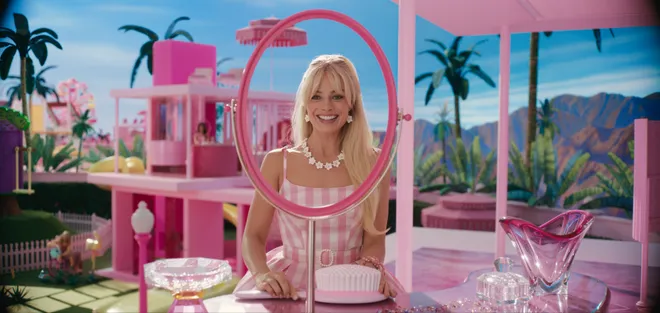Whitney Port, 'Barbie' and the truth about 'too thin'
Whitney Port, former star of "The Hills" recently vowed to maintain her health amid worries from her fans and husband Tim Rosenman about her appearance. Specifically, the 38-year-old's thinness.
"I’ve gotten a lot of comments about looking too thin," Port wrote on her Instagram story last month, according to People. "At first, it didn’t bother me. I chalked it up to people not knowing what my diet looks like. But Timmy brought it to my attention, as a good husband should, and said it's not just something strangers are spewing."
This also comes as "Barbie" has taken over popular culture – and no matter how subversive the movie is, the body image ideals (and problems) associated with the iconic doll haven't gone away.
So, is there such a thing as being "too thin?" No one really can tell anything about someone's health by just looking at them, experts say, but should people speak up if some loved ones' habits warrant cause for concern?
"Certainly being too thin can have very serious medical consequences, as well as serious cognitive as well as emotional consequences too, so I do think that saying something can be very important," says Scott M. Granet, licensed clinical social worker at The OCD-BDD Clinic of Northern California wonders.
Keep in mind, though the idea that anyone can comment on someone else's body simply because of their size is problematic, according to Alexis Conason, clinical psychologist and author of "The Diet-Free Revolution."

'You have to be thin, but not too thin'
Our culture is built on some kind of unrealistic image that women face every waking hour. America Ferrera's speech in "Barbie" put it best: "You have to be thin, but not too thin. And you can never say you want to be thin. You have to say you want to be healthy, but also you have to be thin." The same can be said, to an extent, for men and abs (and more).

We can thank media messaging for that, from movies and magazines and especially now with the unstoppable rise of social media.
"People really are inundated with these kind of images," Granet says.
Body image misconceptions
When it comes to thinness, the truth is that someone could be undernourished at any size. It's a common misconception that someone who is in a larger body couldn't possibly be suffering from an eating disorder – something friends and family and even medical professionals can get wrong.
"There needs to be more recognition that it's very difficult, if not impossible to tell what's going on with somebody's health by their weight," Conason says. "And again, there's a lot of research that shows that the vast majority of people who are struggling with, for example, anorexia, are not 'underweight.'"
Still, "sometimes drastic changes in weight can be indicative of an eating disorder or other health problem," says Charlotte Markey, professor of psychology and chair of the Health Sciences Department at Rutgers University.
When in doubt, 'mind your own business'
Tread lightly if you are going to dip your toe into a conversation about someone's appearance.
"If you have a close friend or family member that you're concerned about, I would look at the reasons outside of just their body size of why you're concerned," Conason says. "Has this person been demonstrating really rigid behaviors around food? Are you noticing this person isn't eating enough?"

You could also try skirting around the issue somewhat. Markey, author of "The Body Image Book for Boys" and "The Body Image Book for Girls," says: "It’s best to not comment critically on people’s bodies or any aspect of their appearance. If you have concerns about someone, it can be appropriate to approach them with kindness and say something like, 'I’ve noticed you’ve lost weight recently and I am concerned that you are not getting enough nourishment. I am here for you if you think you need some support or treatment and I can help you to find resources.'"
That said, "if it’s someone you don’t really know, then it’s usually best to just mind your own business," Markey adds. "Eating disorders are complex mental disorders and comments perceived as shaming can exacerbate them in some cases."
Hmm:What is a thirst trap? How to not hate your friends' vacation photos
On seeking help yourself
If you are worried about your own weight or health, certainly speak to your primary care provider or other medical professional like a dietitian. But simple tips and tricks include being active and eating in ways that feel good to your body; consuming enough fruits and vegetables; not drinking too much nor smoking cigarettes; and sleeping well.
"These are the behaviors that are consistently shown with health improvements," Conason says.
You can also speak to body image or intuitive eating professionals and seek out eating disorder organizations like ANAD or NEDA if you fear you're in trouble, or before it gets to that point.
Also remember that the biggest predictors of health – our genetics and socioeconomic status – are really out of our control.
"We have really this personal responsibility myth around health, where we think that we should be able to fully control our health by controlling our weight and eating in this perfect or ideal way," Conason says. "And that's obviously just not the case. It can lead to a lot of really unhealthy behaviors when we're only focused on our weight."
If you or someone you know is struggling with body image or eating concerns, you can call The National Alliance for Eating Disorders' clinician-run helpline from 9 a.m. until 7 p.m. EST at (866) 662-1235. If you are in crisis or need immediate help, please text “ALLIANCE” to 741741 for free, 24/7 support.
In case you missed:This 'Barbie' moment said what all women are thinking and quickly went viral
Disclaimer: The copyright of this article belongs to the original author. Reposting this article is solely for the purpose of information dissemination and does not constitute any investment advice. If there is any infringement, please contact us immediately. We will make corrections or deletions as necessary. Thank you.







